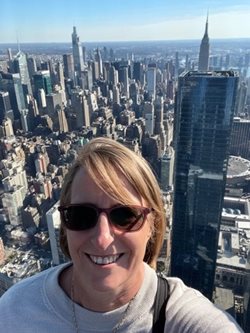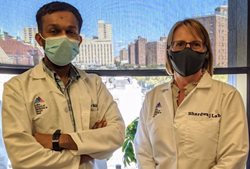
Cancer Program co-leader and head of Mater Research’s Cancer Immunotherapies Research Group, Professor Kristen Radford, is familiar with breaking traditional barriers - forging a very successful career as a leading medical researcher in the emerging field of cancer vaccines, and as a mentor.
Kristen’s group of three postdocs, a research assistant and four students is focussed on understanding human dendritic cell biology and using that understanding to develop potential vaccines to fight all kinds of cancers.
She has authored 55 scientific papers, received more than $7 million in competitive funding, and has one patent to her name.
This International Women’s Day we asked Kristen to outline the lessons she learnt about leadership and success during her recent Fulbright Scholarship spent at the Tisch Cancer Centre in New York.
Did you gain any insights about breaking gender barriers during your 4-month Fulbright Scholarship in the United States?
I had the privilege of spending time with outstanding international female leaders in cancer research. These women have smashed gender barriers and are generous and supportive mentors and advocates who are creating change and a path for the next generation to excel.
What were the  professional highlights of you working at The Tisch Cancer Institute?
professional highlights of you working at The Tisch Cancer Institute?
This was an extraordinary environment that integrates excellence in research, education, and patient care to improve outcomes for cancer patients. I was immersed in a critical mass of the world’s leading experts in dendritic cells, cancer immunology and cancer vaccines.
What progress did you make in your cancer vaccine work while there?
I spent time with several groups that are leading the world in cancer vaccine development and clinical trials. This has given me enormous insight and knowledge into the current state-of-the-art practices and technologies used in the development of cancer vaccines; where the leaders in the field see the future; and opened up opportunities for international partnerships and a whole host of considerations to successfully advance our vaccine program.
Has the Fulbright experience been what you expected and why?
Everything and more. Fulbright is both an academic and cultural exchange that is two-way. In addition to achieving my own professional and research goals, it has enabled me to make more meaningful contributions to global efforts and enhance our reputation on the international stage.
How will the experience change your approach to research?
I now have a  much better understanding and insight of the state of play in cancer vaccine development, the future of the field, where the competition is, and where the challenges and opportunities lie for my research to have the greatest impact globally. This is an enormous asset to the strategic planning and direction of my research efforts moving forward.
much better understanding and insight of the state of play in cancer vaccine development, the future of the field, where the competition is, and where the challenges and opportunities lie for my research to have the greatest impact globally. This is an enormous asset to the strategic planning and direction of my research efforts moving forward.
Did the COVID pandemic pose any problems?
Getting to the US in September 2021 was a challenge – including getting to the US Consulate in Melbourne when borders were shut to obtain a visa; obtaining Federal Government exemptions for my family of four to travel overseas; insurance; and PCR tests. It felt like stacking a precarious house of cards that could come crashing down at any minute had one of us been exposed to COVID. On the plus side New York and its many attractions were just beginning to reopen with vaccine mandates when we arrived. As much of the rest of the world was still locked out, we were able to experience the city like locals and without the crowds. It was exciting to experience the city that never sleeps waking up in the aftermath of COVID.
What have been your personal highlights of the scholarship experience?
Having the opportunity to meet and have a chat with Ugur Sahin, CEO of BioNTech who developed the Pfizer COVID vaccine was a real treat. The warmth, generosity, and amazing talent of the people we met both professionally and personally was wonderful and many of them have become great friends and colleagues. I loved spending lunch breaks in Central Park, enjoying the stunning change of seasons whilst processing the information overload from the morning’s work. It was exhilarating and full-on, both in and out of the lab, and a life changing experience we felt extremely privileged to share as a family.
What is your advice to other women who want to excel in medical research?
You have far more potential and talent than you think you have. Surround yourself with those who will help you realise this and pay it forward.



